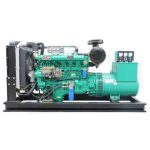Introduction
In today's modern world, electricity is an essential resource that powers our everyday lives. From lighting up our homes to running industrial machinery, a stable and reliable power supply is crucial for maintaining our way of life. One of the key components in ensuring a consistent power supply is voltage regulation. Voltage regulation refers to the process of maintaining a steady voltage level in an electrical system, regardless of fluctuations in load or other external factors. In this article, we will delve into the role of diesel generators in voltage regulation, exploring their benefits, applications, and key considerations.
Understanding Voltage Regulation
Voltage regulation is vital for the proper functioning of electrical equipment and appliances. In an ideal scenario, the voltage supplied to a system remains constant at all times. However, in reality, voltage levels can fluctuate due to various factors such as changes in load demand, grid instability, or equipment malfunctions. These fluctuations can lead to voltage spikes or drops, which can damage sensitive equipment and disrupt operations.
To address this issue, voltage regulation systems are employed to ensure that the voltage supplied to electrical systems remains within a specified range. These systems can be passive, such as voltage stabilizers or active, such as generators. Diesel generators are a popular choice for voltage regulation due to their reliability, efficiency, and ability to provide power independently of the grid.
Diesel Generators for Voltage Regulation
Diesel generators are versatile machines that are commonly used for backup power generation in various applications, including residential, commercial, and industrial settings. In addition to their primary function of providing emergency power during outages, diesel generators can also be utilized for voltage regulation purposes. By acting as a supplementary power source, diesel generators can help stabilize voltage levels and ensure a consistent power supply in critical systems.
One of the key advantages of using diesel generators for voltage regulation is their ability to respond quickly to changes in load demand. Unlike grid-connected power sources that may take time to ramp up or down, diesel generators can provide instant power when needed. This rapid response time is crucial for maintaining voltage stability in dynamic environments where load fluctuations are common.
Furthermore, diesel generators are known for their robustness and durability, making them well-suited for continuous operation in challenging conditions. Whether deployed in remote locations, harsh environments, or critical infrastructure facilities, diesel generators can reliably regulate voltage and provide a stable power supply when other sources may fail.
Applications of Diesel Generators for Voltage Regulation
The versatility of diesel generators makes them suitable for a wide range of applications where voltage regulation is essential. 150kw diesel generator for remote commercial use where diesel generators are used for voltage regulation include:
1. Industrial Facilities: Manufacturing plants, refineries, and other industrial facilities often rely on a stable power supply to maintain production processes. Diesel generators can be integrated into the electrical system to regulate voltage and ensure uninterrupted operation.
2. Data Centers: Data centers house critical IT infrastructure that requires a constant and reliable power supply. Diesel generators are commonly used as backup power sources to maintain voltage stability and prevent data loss during outages.
3. Hospitals: Healthcare facilities such as hospitals and clinics rely on electricity to power life-saving equipment and maintain patient care. Diesel generators play a crucial role in ensuring voltage regulation and backup power in case of emergencies.
4. Telecommunication Towers: Mobile network operators use diesel generators to provide backup power for telecommunication towers. By regulating voltage levels, diesel generators help maintain connectivity during power outages.
5. Remote Locations: Off-grid sites, remote communities, and construction sites often lack access to a stable power grid. Diesel generators can be deployed in these locations to regulate voltage and provide a reliable power supply for essential operations.
Key Considerations for Using Diesel Generators for Voltage Regulation

While diesel generators offer numerous benefits for voltage regulation, there are several key considerations to keep in mind when incorporating them into an electrical system:
1. Sizing and Capacity: Proper sizing of the diesel generator is crucial to ensure that it can meet the power demands of the system and maintain voltage stability. Undersized generators may lead to voltage fluctuations, while oversized generators can result in inefficiency and increased operating costs.
2. Fuel Supply: Diesel generators require a steady fuel supply to operate continuously. It is essential to have sufficient fuel reserves and a refueling plan in place to prevent interruptions in power supply.
3. Maintenance and Monitoring: Regular maintenance and monitoring of diesel generators are essential to ensure optimal performance and reliability. Routine inspections, testing, and servicing can help identify potential issues early and prevent downtime.
4. Environmental Considerations: Diesel generators emit exhaust gases and noise during operation, which may need to be addressed to comply with environmental regulations. Installing soundproof enclosures and implementing emission control measures can mitigate the impact of diesel generator operation on the surroundings.
5. Integration with Existing Systems: When integrating diesel generators for voltage regulation, it is important to consider how they will interact with existing electrical systems. Proper synchronization, load sharing, and control mechanisms should be implemented to ensure seamless operation and voltage regulation.
Conclusion
In conclusion, diesel generators play a crucial role in voltage regulation by providing a reliable and stable power supply in diverse applications. Their rapid response time, durability, and versatility make them well-suited for maintaining voltage stability in dynamic environments where fluctuations in load demand are common. By understanding the benefits, applications, and key considerations of using diesel generators for voltage regulation, electrical engineers and system operators can optimize their power systems for efficiency and reliability. Diesel generators continue to be a valuable asset in ensuring uninterrupted power supply and voltage regulation in critical infrastructure around the world.
